Unit 6 Enjoying Cycling Topic 1 We're going on a three-day visit to Mount TaiSection D 课件(共有PPT29张)
文档属性
| 名称 | Unit 6 Enjoying Cycling Topic 1 We're going on a three-day visit to Mount TaiSection D 课件(共有PPT29张) | 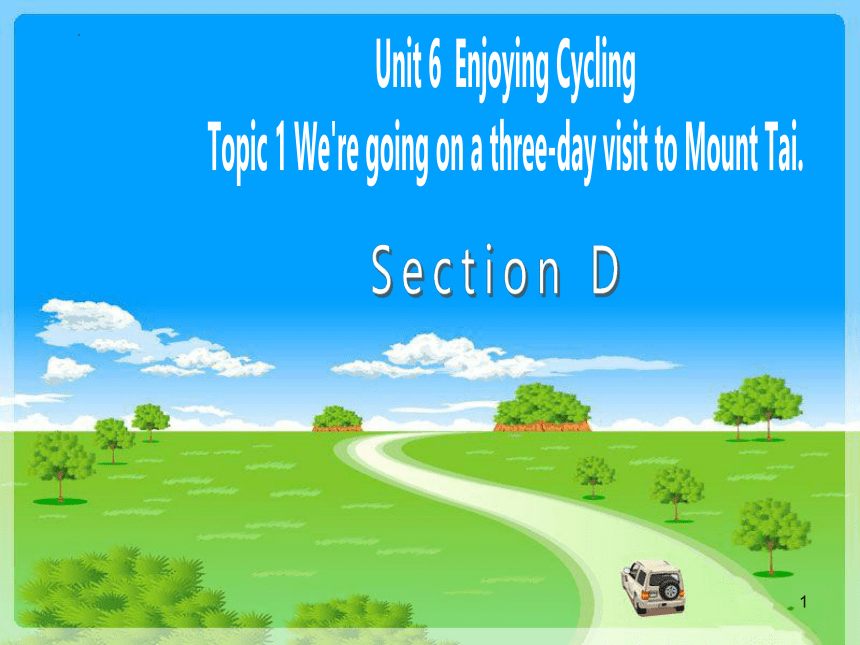 | |
| 格式 | pptx | ||
| 文件大小 | 3.3MB | ||
| 资源类型 | 教案 | ||
| 版本资源 | 仁爱科普版 | ||
| 科目 | 英语 | ||
| 更新时间 | 2022-03-30 15:51:13 | ||
图片预览

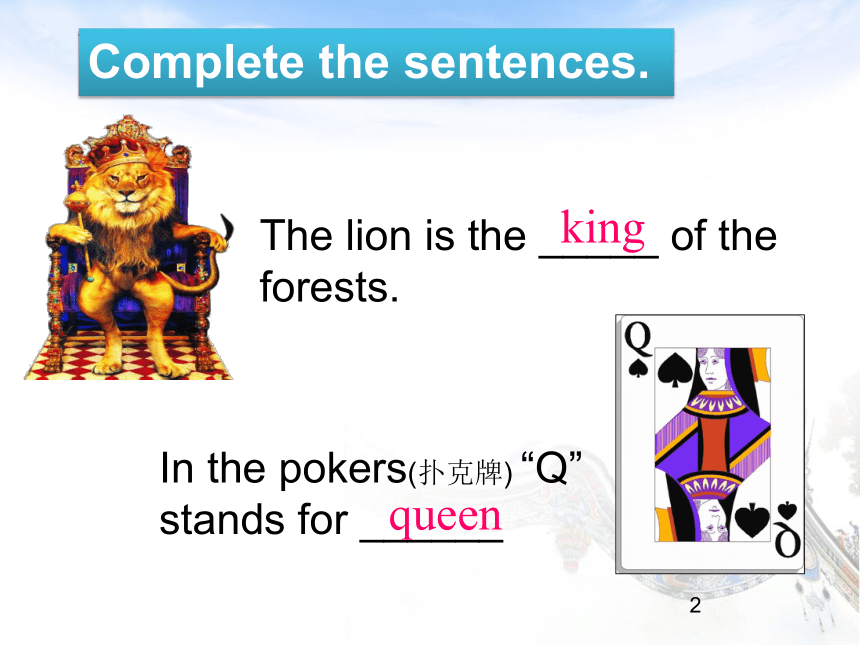
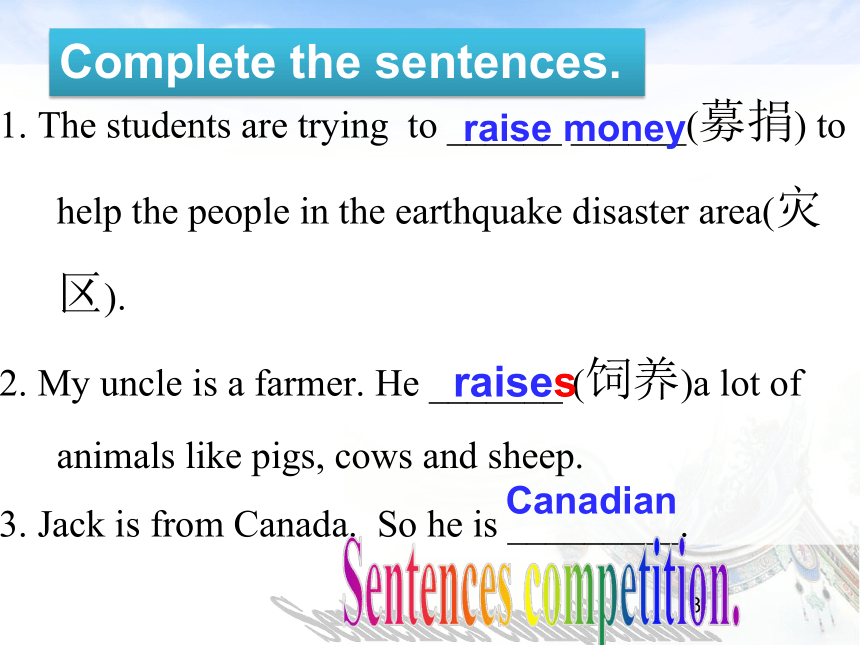
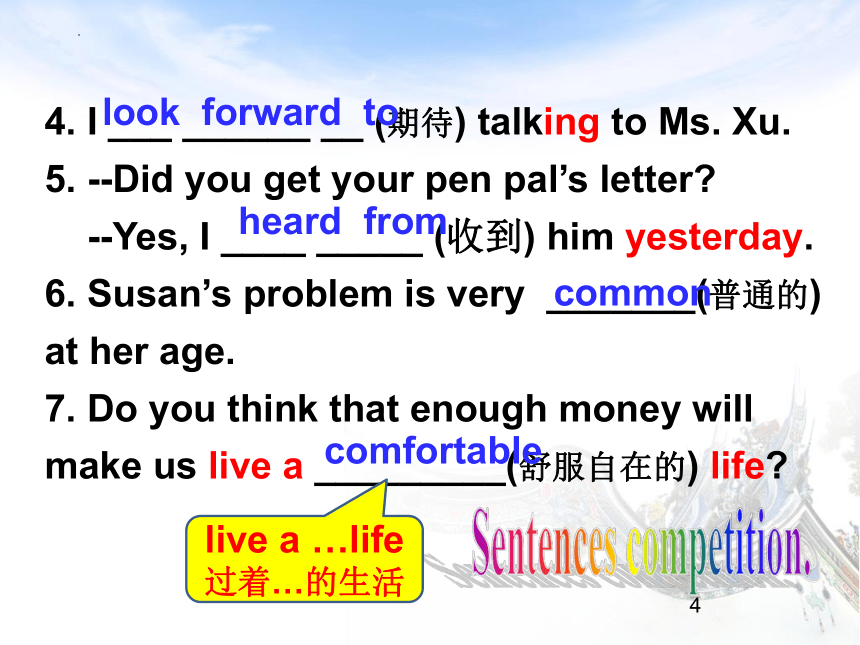
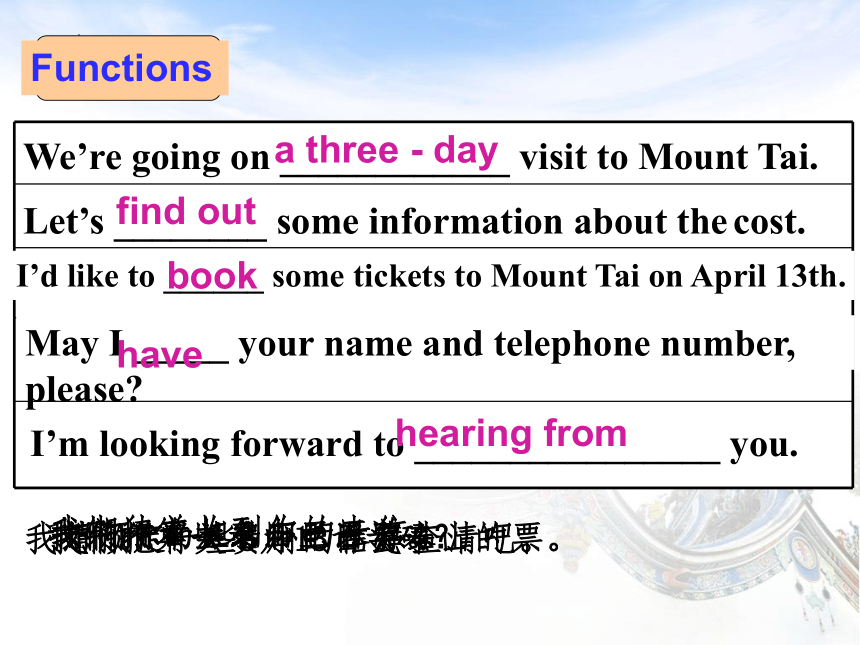
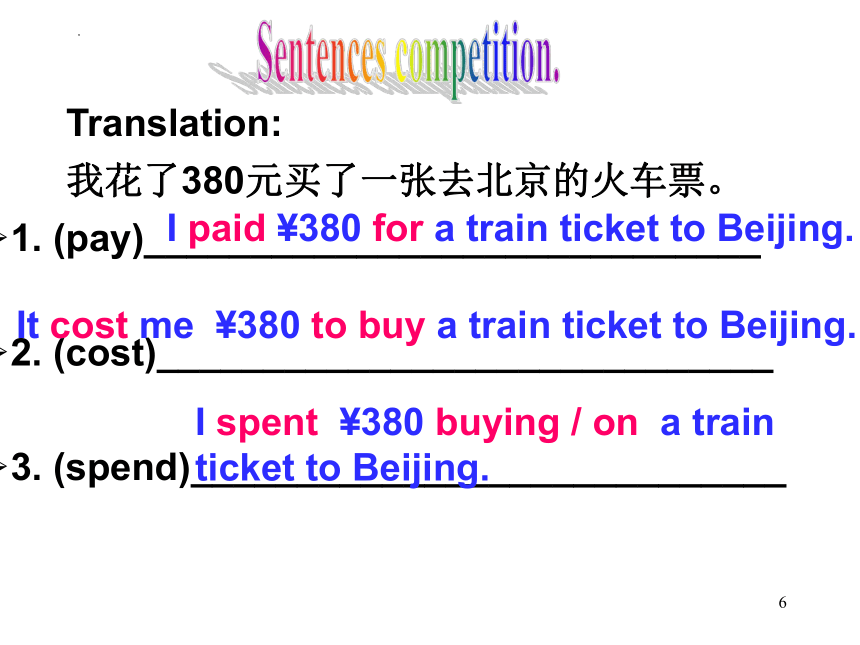
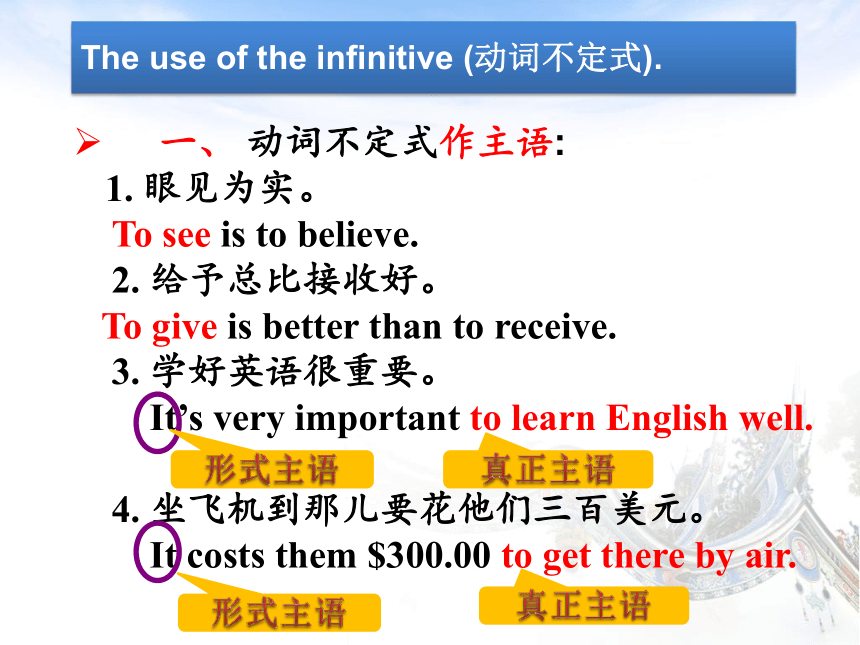
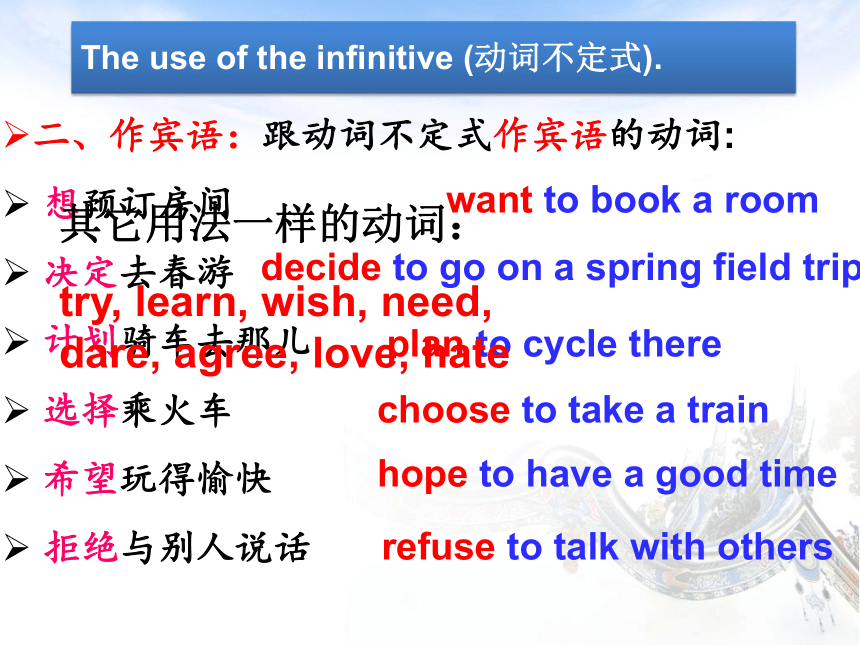
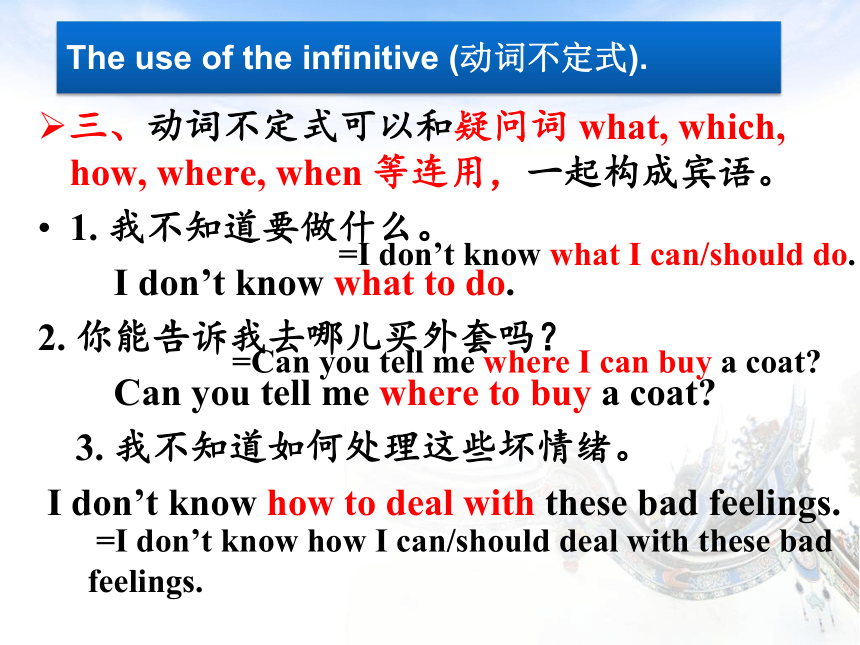
文档简介
(共29张PPT)
Section DUnit 6 Enjoying CyclingTopic 1 We're going on a three-day visit to Mount Tai.The lionis the _____ of the plete the sentences.In the pokers(扑克牌)“Q” stands for ______kingqueen1. The students are trying to ______ ______(募捐) to help the people in the earthquake disaster area(灾区).2. My uncle is a farmer. He _______ (饲养)a lot of animals like pigs, cows and sheep.3. Jack is from Canada. So he is _________.raise moneyCanadianraisesSentences competition.Complete the sentences.4. I ___ ______ __ (期待) talkingto Ms. Xu.5. --Did you get your pen pal’s letter --Yes, I ____ _____ (收到) himyesterday.6. Susan’s problem is very _______(普通的) at her age.7. Do you think that enough money will make uslive a_________(舒服自在的)life look forward tocommoncomfortableSentences competition.live a …life过着…的生活heard from
Functions
Let’s ________ some information about the cost.
May I _____ your name and telephone number, please
I’d like to ______ some tickets to Mount Tai on April 13th.
I’m looking forward to ________________ you.
We’re going on ____________ visit to Mount Tai.
我们打算去泰山三日游。
我们把有关费用的信息查清吧。
我想预定一些3月13日去泰山的票。
请问你的姓名和电话号码?
我期待着收到你的来信。
find out
a three - day
book
have
hearing from
Translation:我花了380元买了一张去北京的火车票。1. (pay)_____________________________2. (cost)_____________________________3. (spend)____________________________Ipaid 380fora train ticket to Beijing.Sentences competition.Itcostme 380to buya train ticket to Beijing.Ispent 380buying / ona train ticket to Beijing.The use of the infinitive (动词不定式).
一、 动词不定式作主语:
1. 眼见为实。
To see is to believe.
2. 给予总比接收好。
To give is better than to receive.
3. 学好英语很重要。
It’s very important to learn English well.
4. 坐飞机到那儿要花他们三百美元。
It costs them $300.00 to get there by air.
形式主语
真正主语
形式主语
真正主语
The use of the infinitive (动词不定式).
二、作宾语:跟动词不定式作宾语的动词:
想预订房间
决定去春游
计划骑车去那儿
选择乘火车
希望玩得愉快
拒绝与别人说话
want to book a room
decide to go on a spring field trip
plan to cycle there
choose to take a train
hope to have a good time
refuse to talk with others
其它用法一样的动词:
try, learn, wish, need, dare, agree, love, hate
三、动词不定式可以和疑问词 what, which, how, where, when 等连用,一起构成宾语。
1. 我不知道要做什么。
I don’t know what to do.
2. 你能告诉我去哪儿买外套吗?
Can you tell me where to buy a coat
3. 我不知道如何处理这些坏情绪。
I don’t know how to deal with these bad feelings.
The use of the infinitive (动词不定式).
=I don’t know what I can/should do.
=Can you tell me where I can buy a coat
=I don’t know how I can/should deal with these bad
feelings.
The use of the infinitive (动词不定式).
四、作宾补:跟带to的动词不定式作宾补的动词:
v. + sb. (not ) to do sth.
告诉
命令
想要
教
tell
order
want / would like
teach
ask
invite
建议
希望
邀请
要求
advise
wish
Try to make sentences with the above words.
help可用help sb. to do sth. 也可用 help sb. do sth.的结构
The use of the infinitive (动词不定式).
五、跟不带to的动词不定式作宾补的动词:
make, have, let 等使役动词和 see, watch, notice, feel, hear 等感官动词
v. + sb. (not ) do sth.
我看见他几乎每天都打篮球。
I see him play basketball almost every day.
老板强迫工人整天干活。
The boss makes the workers work all day.
The use of the infinitive (动词不定式).
六、动词不定式作后置定语:
我有好消息告诉你们。
你想要来点儿吃的东西吗?
放风筝最好的时节是秋天。
I have some great news to tell you.
Would you like something to eat
The best time to fly kites is autumn.
作定语修饰news
The use of the infinitive (动词不定式).
七、 动词不定式作表语:
1. 我的职责是教好你们。
My duty is to teach you well.
2. 他的梦想是当个主持人。
His dream is to be a host.
3. 学好英语最好的方式是使用它。
The best way to learn English well is to use it.
表语
作定语
表语
The use of the infinitive (动词不定式).
八、动词不定式作目的状语:
我要去北京看长城。
为了赶上早班车,他每天很早起床。
他们决定上网以获取更多的信息。
I want to go to Beijing to visit the Great Wall.
He gets up early to catch the early bus every day.
They decided to search the Internet to get more information.
= in order to…
1. 动词不定式的基本形式是:“to + 动词原形” ,有时可以不带to, 动词不定式没有人称和数的变化。
2.动词不定式在句中可作主语、表语、宾语、宾语补足语、定语和状语。
3. 动词不定式的否定式为:not+ 动词不定式
4. 动词不定式可以和疑问词what, which, how, where, when 等连用。
The use of the infinitive
动词不定式 用法小结:
Grammar
Infinitive
1.I have some exciting news ____(tell/to tell/telling) you!
2.But it will take us a few days ____(to get / get / getting) there by bike.
3.Kangkang helped us ____ (book / booking) the train tickets.
4.Why don’t we put on a show ____ (to raise / raising / raise) money
The use of the infinitive (动词不定式).
作定语
作主语
作宾语补足语
作目的状语
作形式主语
Complete the sentences with the proper form of the given words.1. The best way_______(raise) money is______ (sell) old books.2. The four children decided _____ (sell) newspapers to raise money4. I don't know how _______ ( stop ) these bad feelings.6. The policeman told us ___________( not play ) in the street.to selltosellto stopnot to play作表语作宾语与疑问词how连用否定式为:not+动词不定式toraise作定语作宾补How to write a passage to describe one of your favorite trips 2___________________________________________________________________________________________________________________________________________________________________________________________________timeplacepeoplepreparationhow long does it take to...how much does it cost to...what to dohow you feelI felt tired but happy/excited, I want to travel there again.I had a great/ wonderful/ an unforgettable trip.tense(时态)?Sandy’s Trip to Japan
Sandy
1a
Number the sentences to form a passage about Sandy’s trip to Japan.
1a
( ) But the most interesting thing for me was to take photos. I love to take photos with my friends in beautiful places.
( ) On the third day of our trip, we climbed Mount Fuji. It was snowing when we got to the top. I was so excited that I didn’t feel cold at all.
( 1 ) Our plane left Beijing at 7:30 a.m. and landed safely in Japan after about four hours. The weather was pleasant.
( ) During our trip, in the evenings, I sometimes went swimming in the pool, while my best friend, Kelly, always went shopping.
( ) The next day, we went to a famous park. It was really an interesting place to visit.
( ) I enjoyed the trip very much, so I want to travel there again.
2
3
4
5
6
Do you know the sequence(顺序) of the passage
spacial sequence(空间顺序) or time sequence(时间顺序)
Read the passage in 1a and mark T (True) or F (False).1bWe went to Japan by ship.()On the second day of our trip, we went to a famous and interesting park.()We climbed Mount Fuji on the third day of ourtrip. ()The weather there was not cold when we go tothetopofMount Fuji. ( )The most interesting thing for me wasto take photos with my parents.( )FTTFF[t p]n.顶部Number the sentences to form a passage about Sandy’s trip to Japan.
1a
( ) But the most interesting thing for me was to take photos. I love to take photos with my friends in beautiful places.
( ) On the third day of our trip, we climbed Mount Fuji. It was snowing when we got to the top. I was so excited that I didn’t feel cold at all.
( 1 ) Our plane left Beijing at 7:30 a.m. and landed safely in Japan after about four hours. The weather was pleasant.
( ) During our trip, in the evenings, I sometimes went swimming in the pool, while my best friend, Kelly, always went shopping.
( ) The next day, we went to a famous park. It was really an interesting place to visit.
( ) I enjoyed the trip very much, so I want to travel there again.
2
3
4
5
6
不定式充当表语
when引导的时间状语从句,主句用过去时,从句也用相应的过去时态。
=I was too excited to feel cold at tall.
安全着陆、降落
不定式充当后置定语
get to the top
到达山顶
我们假期的第三天
不定式充当宾语
而,表对比
令人愉快的; 宜人的
不定式充当宾语
Key sentences(重点句)
1. Our plane left Beijing at 7:30 a.m. and landed safely in Japan after about four hours. The weather was pleasant.
2.On the third day of our trip, we climbed Mount Fuji. It was snowing when we got to the top. I was so excited that I didn’t feel cold at all.
3.During our trip, in the evenings, I sometimes went swimming in the pool, while my best friend, Kelly, always went shopping.
An example for 2:Lastsummer holiday,Iwent on a 5-day visit to Beijing with my family.I was so excited that I couldn’t fall asleepthe night before we started out.I got up early and checked mybag. I tooka camera, some clothes, a map and so on. It tookusabout15hours to get there by train.Wevisited many places of interest such as the Great Wall,Tian’anmenSquare,the SummerPalace and so on. Weenjoyedourselvesvery much because they are sowonderful.I felt tired but excited because I learned a lot about the history of this beautiful city.SummaryWe learn:Useful expressions:get to the top, so… that…, land safely, an interesting place to visit, the next day, love to take photosThe infinitive:But it will take us a few daysto getthere by bike.I wantto booksome rooms.Why don’t we put on a showto raisemoney SummaryWe can:Talk about our field trip. Make plans for it such as the cost, vehicles to choose, etc.Use theinfinitive as object, object complement and adverbial of purpose correctly.Project
Survey your classmates about where they would like to travel. Then work out the total cost.
Work in groups and choose one of the most popular places for you to travel. Then find out more information about traveling there.
Discuss and write down your travel route and schedule.
You can begin like this:
We’re going to visit Mount Huang for three days…
Name Place Total cost
HomeworkReview the key points in this topic and master the important new words, phrases and useful expressions.Write your traveling plan or the experience of your own trip.Preview Section A of Topic 2.The end.Thanks!
Section DUnit 6 Enjoying CyclingTopic 1 We're going on a three-day visit to Mount Tai.The lionis the _____ of the plete the sentences.In the pokers(扑克牌)“Q” stands for ______kingqueen1. The students are trying to ______ ______(募捐) to help the people in the earthquake disaster area(灾区).2. My uncle is a farmer. He _______ (饲养)a lot of animals like pigs, cows and sheep.3. Jack is from Canada. So he is _________.raise moneyCanadianraisesSentences competition.Complete the sentences.4. I ___ ______ __ (期待) talkingto Ms. Xu.5. --Did you get your pen pal’s letter --Yes, I ____ _____ (收到) himyesterday.6. Susan’s problem is very _______(普通的) at her age.7. Do you think that enough money will make uslive a_________(舒服自在的)life look forward tocommoncomfortableSentences competition.live a …life过着…的生活heard from
Functions
Let’s ________ some information about the cost.
May I _____ your name and telephone number, please
I’d like to ______ some tickets to Mount Tai on April 13th.
I’m looking forward to ________________ you.
We’re going on ____________ visit to Mount Tai.
我们打算去泰山三日游。
我们把有关费用的信息查清吧。
我想预定一些3月13日去泰山的票。
请问你的姓名和电话号码?
我期待着收到你的来信。
find out
a three - day
book
have
hearing from
Translation:我花了380元买了一张去北京的火车票。1. (pay)_____________________________2. (cost)_____________________________3. (spend)____________________________Ipaid 380fora train ticket to Beijing.Sentences competition.Itcostme 380to buya train ticket to Beijing.Ispent 380buying / ona train ticket to Beijing.The use of the infinitive (动词不定式).
一、 动词不定式作主语:
1. 眼见为实。
To see is to believe.
2. 给予总比接收好。
To give is better than to receive.
3. 学好英语很重要。
It’s very important to learn English well.
4. 坐飞机到那儿要花他们三百美元。
It costs them $300.00 to get there by air.
形式主语
真正主语
形式主语
真正主语
The use of the infinitive (动词不定式).
二、作宾语:跟动词不定式作宾语的动词:
想预订房间
决定去春游
计划骑车去那儿
选择乘火车
希望玩得愉快
拒绝与别人说话
want to book a room
decide to go on a spring field trip
plan to cycle there
choose to take a train
hope to have a good time
refuse to talk with others
其它用法一样的动词:
try, learn, wish, need, dare, agree, love, hate
三、动词不定式可以和疑问词 what, which, how, where, when 等连用,一起构成宾语。
1. 我不知道要做什么。
I don’t know what to do.
2. 你能告诉我去哪儿买外套吗?
Can you tell me where to buy a coat
3. 我不知道如何处理这些坏情绪。
I don’t know how to deal with these bad feelings.
The use of the infinitive (动词不定式).
=I don’t know what I can/should do.
=Can you tell me where I can buy a coat
=I don’t know how I can/should deal with these bad
feelings.
The use of the infinitive (动词不定式).
四、作宾补:跟带to的动词不定式作宾补的动词:
v. + sb. (not ) to do sth.
告诉
命令
想要
教
tell
order
want / would like
teach
ask
invite
建议
希望
邀请
要求
advise
wish
Try to make sentences with the above words.
help可用help sb. to do sth. 也可用 help sb. do sth.的结构
The use of the infinitive (动词不定式).
五、跟不带to的动词不定式作宾补的动词:
make, have, let 等使役动词和 see, watch, notice, feel, hear 等感官动词
v. + sb. (not ) do sth.
我看见他几乎每天都打篮球。
I see him play basketball almost every day.
老板强迫工人整天干活。
The boss makes the workers work all day.
The use of the infinitive (动词不定式).
六、动词不定式作后置定语:
我有好消息告诉你们。
你想要来点儿吃的东西吗?
放风筝最好的时节是秋天。
I have some great news to tell you.
Would you like something to eat
The best time to fly kites is autumn.
作定语修饰news
The use of the infinitive (动词不定式).
七、 动词不定式作表语:
1. 我的职责是教好你们。
My duty is to teach you well.
2. 他的梦想是当个主持人。
His dream is to be a host.
3. 学好英语最好的方式是使用它。
The best way to learn English well is to use it.
表语
作定语
表语
The use of the infinitive (动词不定式).
八、动词不定式作目的状语:
我要去北京看长城。
为了赶上早班车,他每天很早起床。
他们决定上网以获取更多的信息。
I want to go to Beijing to visit the Great Wall.
He gets up early to catch the early bus every day.
They decided to search the Internet to get more information.
= in order to…
1. 动词不定式的基本形式是:“to + 动词原形” ,有时可以不带to, 动词不定式没有人称和数的变化。
2.动词不定式在句中可作主语、表语、宾语、宾语补足语、定语和状语。
3. 动词不定式的否定式为:not+ 动词不定式
4. 动词不定式可以和疑问词what, which, how, where, when 等连用。
The use of the infinitive
动词不定式 用法小结:
Grammar
Infinitive
1.I have some exciting news ____(tell/to tell/telling) you!
2.But it will take us a few days ____(to get / get / getting) there by bike.
3.Kangkang helped us ____ (book / booking) the train tickets.
4.Why don’t we put on a show ____ (to raise / raising / raise) money
The use of the infinitive (动词不定式).
作定语
作主语
作宾语补足语
作目的状语
作形式主语
Complete the sentences with the proper form of the given words.1. The best way_______(raise) money is______ (sell) old books.2. The four children decided _____ (sell) newspapers to raise money4. I don't know how _______ ( stop ) these bad feelings.6. The policeman told us ___________( not play ) in the street.to selltosellto stopnot to play作表语作宾语与疑问词how连用否定式为:not+动词不定式toraise作定语作宾补How to write a passage to describe one of your favorite trips 2___________________________________________________________________________________________________________________________________________________________________________________________________timeplacepeoplepreparationhow long does it take to...how much does it cost to...what to dohow you feelI felt tired but happy/excited, I want to travel there again.I had a great/ wonderful/ an unforgettable trip.tense(时态)?Sandy’s Trip to Japan
Sandy
1a
Number the sentences to form a passage about Sandy’s trip to Japan.
1a
( ) But the most interesting thing for me was to take photos. I love to take photos with my friends in beautiful places.
( ) On the third day of our trip, we climbed Mount Fuji. It was snowing when we got to the top. I was so excited that I didn’t feel cold at all.
( 1 ) Our plane left Beijing at 7:30 a.m. and landed safely in Japan after about four hours. The weather was pleasant.
( ) During our trip, in the evenings, I sometimes went swimming in the pool, while my best friend, Kelly, always went shopping.
( ) The next day, we went to a famous park. It was really an interesting place to visit.
( ) I enjoyed the trip very much, so I want to travel there again.
2
3
4
5
6
Do you know the sequence(顺序) of the passage
spacial sequence(空间顺序) or time sequence(时间顺序)
Read the passage in 1a and mark T (True) or F (False).1bWe went to Japan by ship.()On the second day of our trip, we went to a famous and interesting park.()We climbed Mount Fuji on the third day of ourtrip. ()The weather there was not cold when we go tothetopofMount Fuji. ( )The most interesting thing for me wasto take photos with my parents.( )FTTFF[t p]n.顶部Number the sentences to form a passage about Sandy’s trip to Japan.
1a
( ) But the most interesting thing for me was to take photos. I love to take photos with my friends in beautiful places.
( ) On the third day of our trip, we climbed Mount Fuji. It was snowing when we got to the top. I was so excited that I didn’t feel cold at all.
( 1 ) Our plane left Beijing at 7:30 a.m. and landed safely in Japan after about four hours. The weather was pleasant.
( ) During our trip, in the evenings, I sometimes went swimming in the pool, while my best friend, Kelly, always went shopping.
( ) The next day, we went to a famous park. It was really an interesting place to visit.
( ) I enjoyed the trip very much, so I want to travel there again.
2
3
4
5
6
不定式充当表语
when引导的时间状语从句,主句用过去时,从句也用相应的过去时态。
=I was too excited to feel cold at tall.
安全着陆、降落
不定式充当后置定语
get to the top
到达山顶
我们假期的第三天
不定式充当宾语
而,表对比
令人愉快的; 宜人的
不定式充当宾语
Key sentences(重点句)
1. Our plane left Beijing at 7:30 a.m. and landed safely in Japan after about four hours. The weather was pleasant.
2.On the third day of our trip, we climbed Mount Fuji. It was snowing when we got to the top. I was so excited that I didn’t feel cold at all.
3.During our trip, in the evenings, I sometimes went swimming in the pool, while my best friend, Kelly, always went shopping.
An example for 2:Lastsummer holiday,Iwent on a 5-day visit to Beijing with my family.I was so excited that I couldn’t fall asleepthe night before we started out.I got up early and checked mybag. I tooka camera, some clothes, a map and so on. It tookusabout15hours to get there by train.Wevisited many places of interest such as the Great Wall,Tian’anmenSquare,the SummerPalace and so on. Weenjoyedourselvesvery much because they are sowonderful.I felt tired but excited because I learned a lot about the history of this beautiful city.SummaryWe learn:Useful expressions:get to the top, so… that…, land safely, an interesting place to visit, the next day, love to take photosThe infinitive:But it will take us a few daysto getthere by bike.I wantto booksome rooms.Why don’t we put on a showto raisemoney SummaryWe can:Talk about our field trip. Make plans for it such as the cost, vehicles to choose, etc.Use theinfinitive as object, object complement and adverbial of purpose correctly.Project
Survey your classmates about where they would like to travel. Then work out the total cost.
Work in groups and choose one of the most popular places for you to travel. Then find out more information about traveling there.
Discuss and write down your travel route and schedule.
You can begin like this:
We’re going to visit Mount Huang for three days…
Name Place Total cost
HomeworkReview the key points in this topic and master the important new words, phrases and useful expressions.Write your traveling plan or the experience of your own trip.Preview Section A of Topic 2.The end.Thanks!
同课章节目录
- Unit 5 Feeling excited
- Topic 1 You look excited
- Topic 2 I’m feeling better now.
- Topic 3 Many things can affect our feelings.
- Unit 6 Enjoying Cycling
- Topic 1 We're going on a three-day visit to Mount
- Topic 2 How about exploring Tian’anmen Square?
- Topic 3 Bicycle riding is good exercise.
- Unit 7 Food festival
- Topic 1 We’re preparing for a food festival.
- Topic 2 I’m not sure whether I can cook it well.
- Topic 3 I Cooked the Most Successfully
- Unit 8 Our Clothes
- Topic 1 We will have a class fashion show.
- Topic 2 We can design our own uniforms.
- Topic 3 He said the fashion show was wonderful.
